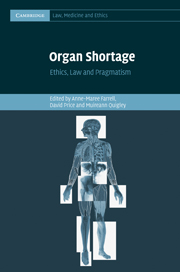Book contents
- Frontmatter
- Contents
- List of figures
- List of tables
- Contributors
- Acknowledgements
- List of abbreviations
- Table of cases
- Table of legislation
- Part I Setting the scene
- Part II Current issues affecting organ shortage
- 3 Organ donation and transplantation: meeting the needs of a multi-ethnic and multi-faith UK population
- 4 Educating the public to encourage organ donation?
- 5 Bereavement, decision-making and the family in organ donation
- Part III Strategies for addressing organ shortage
- Part IV Comparative perspectives
- Part V Current reform and future challenges
- Bibliography
- Index
- References
4 - Educating the public to encourage organ donation?
from Part II - Current issues affecting organ shortage
Published online by Cambridge University Press: 29 March 2011
- Frontmatter
- Contents
- List of figures
- List of tables
- Contributors
- Acknowledgements
- List of abbreviations
- Table of cases
- Table of legislation
- Part I Setting the scene
- Part II Current issues affecting organ shortage
- 3 Organ donation and transplantation: meeting the needs of a multi-ethnic and multi-faith UK population
- 4 Educating the public to encourage organ donation?
- 5 Bereavement, decision-making and the family in organ donation
- Part III Strategies for addressing organ shortage
- Part IV Comparative perspectives
- Part V Current reform and future challenges
- Bibliography
- Index
- References
Summary
The recent Organ Donation Taskforce Report published in the United Kingdom (UK) rejected an opt-out system but emphasised again the importance of educating the public, especially those groups with low rates of donation. The call for more education often carries the assumption that increased knowledge will result in a specific (desired) action: more sex education to reduce unwanted pregnancies among young girls or more education on organ transplantation to increase donation rates. As shown by public engagement in science, however, it is too simple to assume that increased information will result in particular attitudes or behaviour. This chapter examines public education in the field of organ transplantation and how it relates to other public engagement activities, to public attitudes and to the usual focus of public health education on prevention, as well as treatment. The underlying question is why the need to find resources to meet the demand for organ transplants is not queried when other areas of healthcare, in a publicly funded system, are subject to various forms of rationing.
Engaging the public
Public engagement has become an expected part of research projects in the fields of science and technology, including those funded by the European Commission. The UK-government-funded Biotechnology and Biological Sciences Research Council (BBSRC) expects grant-holders to ‘engage actively with the public at both the local and national levels about their research and its broader implications’, and the Medical Research Council (MRC) asks researchers to indicate, ‘where appropriate’, their plans for ‘involving the public actively in any of the stages of your research’ (author's emphasis).
- Type
- Chapter
- Information
- Organ ShortageEthics, Law and Pragmatism, pp. 52 - 66Publisher: Cambridge University PressPrint publication year: 2011
References
- 3
- Cited by



